My Ph.D. Journey
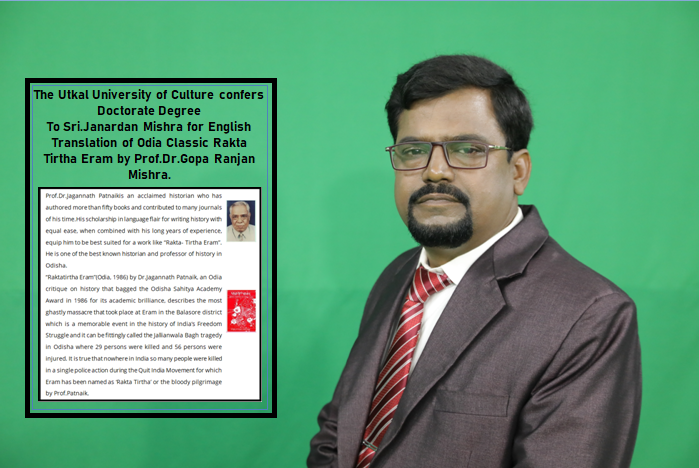
Discovering one’s passion is a continuous, sometimes a lifelong journey. It takes many moments of thoughtful self-reflection, attention and action to find the topics, tasks and industries that make you feel excited. How one might integrate one’s passions into life varies significantly from person to person. Some people choose to pursue their passions as an amusement outside the ambit of their work, while others prefer to dedicate their whole day to their passions. The choice one makes depends on what the passion is and whether or not it is easily transferred into something sustainable and substantial. Well, against this backdrop I always wished to be a researcher, particularly in English language and literature. In fact, I never studied English language and literature during my graduation and post-graduation, and if I have an English Master Degree, it is because of whims and nothing else. But I always love to be associated with learning and teaching English which ultimately made me lenient towards pursuing a PhD degree in English.
As the director of a job-grooming organisation called Ravenshaw Helpline, I remain busy in developing the English speaking skill of my students and also making them employable. I prepare literature for them and make keep them motivated with learning by doing. I make them participate in group discussions, personal interviews, forums, presentations, seminars, etc. That is why I always want to learn a lot for myself and also for my students. I have an aura to know something new, something novel. Hence, I started dreaming for a PhD degree! Our higher education system has expanded at a simply phenomenal rate during the 21st century – and it shows no sign of stopping. This rapid growth in the number of individual universities is also producing a range of PhD research opportunities, ranging from cutting-edge science and engineering projects to unique programmes exploring the country’s own diverse history and culture. I started a research on enrolling for a PhD degree at any of the universities in Odisha. Finally, I wrote an entrance examination successfully for ensuring my PhD admission at Utkal University of Culture, Bhubaneswar. What makes the entrance examination memorable for me is the result. To my utter surprise, I stood first in the examination and was allotted a special roll number as 01/LL/2015.
The actual journey started ratheron an interesting note from my workplace, i.e. Ravenshaw Helpline, Cuttack to Utkal University of Culture, Bhubaneswar. The university was yet to be popularised as a place for research, but was one of the best options for me at that point of time. It came into existence by virtue of an ordinance by the state government promulgated on the 9 June, 1999, which was later replaced by “Utkal University of Culture Act 1999’’. It was established as a teaching-cum-affiliating university. It was set up in order to engage itself to preserve, promote, propagate and protect the richness of our cultural values by way of making substantive accomplishment through study, research, documentation and continuing education. The University was recognized by the University Grants Commission (UGC) on 1 December, 1999, under Section 2(f) of the U.G.C Act, 1956. It has also been accredited by the Association of India Universities (AIU) since 1 April 2000. After cracking the entrance examination, I was offered an admission as a PhD candidate in the Faculty of Language and Literature.
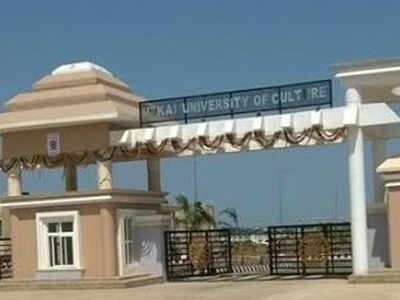
This is how I started my PhD journey in 2015. I was happy and at the same time worried, because I was going back to the classroom as a student after a long time. But I was completely alone. The initial research problem that I explored, was to find out the exact area of research. After a lot of digging into literature and trying out a couple of directions, I realized it was quite a hard problem. So I conveyed it to a good number of teachers as I was yet to get a supervisor. I met Prof.Dr.D.K. Ray, a retired professor who had given shape to one of my English books, English Mantra, published by Partridge, a Penguin Random House Company. Ravenshaw Ratna Awardee, Prof. Ray was adored for his intense love towards English language and literature. I am fortunate enough to come in contact with such an illustrious son of Odisha who had inspired me to pursue my research in the area of ‘translation’. But, he was preoccupied and sent me to meet Dr.Kalyani Samantray, Dr.Jatnidra Nath Nayak and Dr.Himanshu Sekhar Mohapatra, all were professors in the Department of English, Utkal University, Bhubaneswar. Regrettably, all of them were upfront regarding accepting me as their scholar. It was because all of them had to accept the UGC guidelines of having five scholars at a time and all of them had finished their quota.
Hence, I was alone once again. But Prof.Himanshu Sekhar Mohapatra was benevolent enough to suggest me the name of Dr.Goparanjan Mishra, former Principal of J.K.B.K. (Govt.) College and a visiting faculty to Utkal University. Dr. Mishra has worked on Indian English Fiction for his Ph.D. and has presented papers at different Indian Universities. Some of his research articles have been published in National Journals like “The Indian Journal of English Studies, The Critical Endeavour”, etc. He has translated into English some Odia poems of the internationally acclaimed poet Jayant a Mahapatra and also the Hindi poems of the great poet, lyricist and film-maker Gulzar. His “The Sun and the Candle: Some Poems for the Young” has been widely appreciated. He is also known for translating into Odia stories of Rabindranath Tagore, O. Henry, Anton Chekov, Somerset Maugham, Khuswant Singh and Ruskin Bond. Ultimately I met Dr.Gopranjan Mishra with all my testimonials and publications. I also shared with him about my intimacy with Prof. Ray. He agreed to be my supervisor.
It was a unique experience to attend the Pre-PhD Workshop at Utkal University of Culture. It continued for more than six months usually on weekends. Many teachers from Utkal University were taking our classes. I used to sit on the front bench and was very energetic to attend all the lectures sincerely. That is why the results of my written examination after the Pre-PhD Workshop at the university went very well. Wow… eventually I was permitted to go ahead for the final presentation before the SRC (Subject Research Committee) to select the topic for my research. This phase of my PhD journey was the toughest. I rememberProf. Ray helping me out at that time. He had suggested to finalize a topic of my passion, a topic that would keep me interested throughout my research journey. He also strongly recommended me to follow my supervisor’s advice keeping my choices intact. He said, “After all, you are on your way to becoming a doctor and an independent researcher. You will have to work on this subject for at least 3 or 4 years, so you should make sure you like it.” I was just tangled. Then somebody gave me the idea of making a research on Campus Novels in India. I also prepared a synopsis on that for presenting it before my PhD supervisor, but in vain. Again I was helpless. Finally, Dr.GoutamPatanaik, the son of the celebrated historian, Prof.Dr.Jagannath Patnaik, came to my office to get coaching on IELTS, to get a visa to go to Britain. He told me about his father’s work “Raktatirtha Eram”. That was a turning point during my research trip. “RaktatirthaEram” (Odia, 1986) by Dr.Jagannath Patnaik is a great work. Though labelled as a book on history, the literary value of “RaktatirthaEram” is unmistakably immense a fact for which it was awarded by Odisha Sahitya Akademi in 1986 under the category of ‘Essay – Criticism’. The book, apart from being written in a popular reading form, is well documented and a “Knowledge Text”. In line with serious research work, it has footnotes to corroborate events and appendices with copies of original documents. The work is based on British records, enquiry commission reports, confidential letters, reports of the officers, newspaper writings and above all on personal interviews with a number of freedom fighters, affected persons and government officials who were alive by the time the book was brought out. Hence, by all standards, it is a serious research work, which has been highly praised by eminent scholars and historians like Dr.HarekrushnaMahatab and Prof.ManmathNath Das. So I went ahead. My supervisor was very cooperative. I decided to take up ‘translation’ as my research area with “Raktatirtha Eram” at the centre.
As a final point, I started my PhD journey with ‘translation’. Translation study as an academic research area has expanded massively in recent years. It was formerly studied as a language-learning, but now it has been widely used to popularise “Knowledge Text”. “Knowledge Text” translation is the first step towards the goal of establishing translation as an industry. All textual materials meant for the dissemination of knowledge constitute the corpus of “Knowledge Texts” for National Translation Mission. At present, NTM is engaged in the translation of all pedagogic materials related to higher education in 22 Indian lAs a final point, I started my PhD journey with ‘translation’. Translation study as an academic research area has expanded massively in recent years. It was formerly studied as a language-learning, but now it has been widely used to popularise “Knowledge Text”. “Knowledge Text” translation is the first step towards the goal of establishing translation as an industry. All textual materials meant for the dissemination of knowledge constitute the corpus of “Knowledge Texts” for National Translation Mission. At present, NTM is engaged in the translation of all pedagogic materials related to higher education in 22 Indian languages.
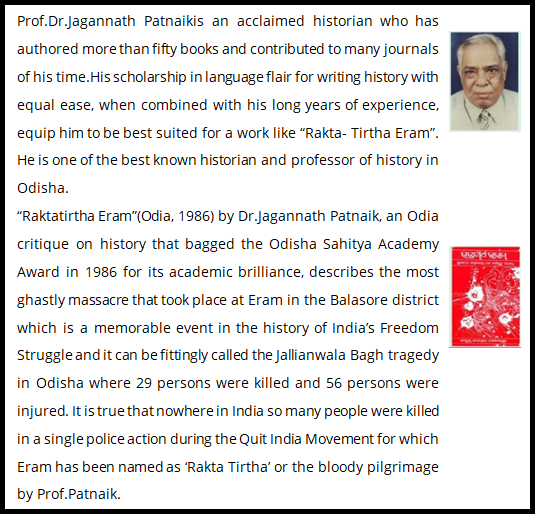
After getting the registration number for research, concluding my Pre-PhD Workshop, getting my favourite topic for research, I was really euphoric. But the hardship was on an anvil. The book “RaktatirthaEram” is written in classical Odia. I found it very tough to translate. Then I met my supervisor. Without providing any personal assistance, he suggested me to meet Dr.JatnidraNathNayak, the popular translator of Odisha who is famous for translating many classical Odia books into English. I was embarrassed. I realized that my PhD supervisor was not competent enough to guide me, an impression which did not last long. On the other hand, looking at my helplessness and not knowing my translation skill, Dr.Nayak suggested me to pay and get translated which I did not like. So the real struggle started. I started translating the book on my own merit which took almost six years. In between, I could handle the anxieties of my supervisor, want of resources, unavailability of time for translation, my father’s death (2017), COVID-19, my elder brother’s death (2019), officials in the university longing for tips, so on and so forth. The rest is history. I would consult Odia professors, dictionaries, placate to my supervisor, paying tips to the university officials, etc. Finally, I completed my thesis.
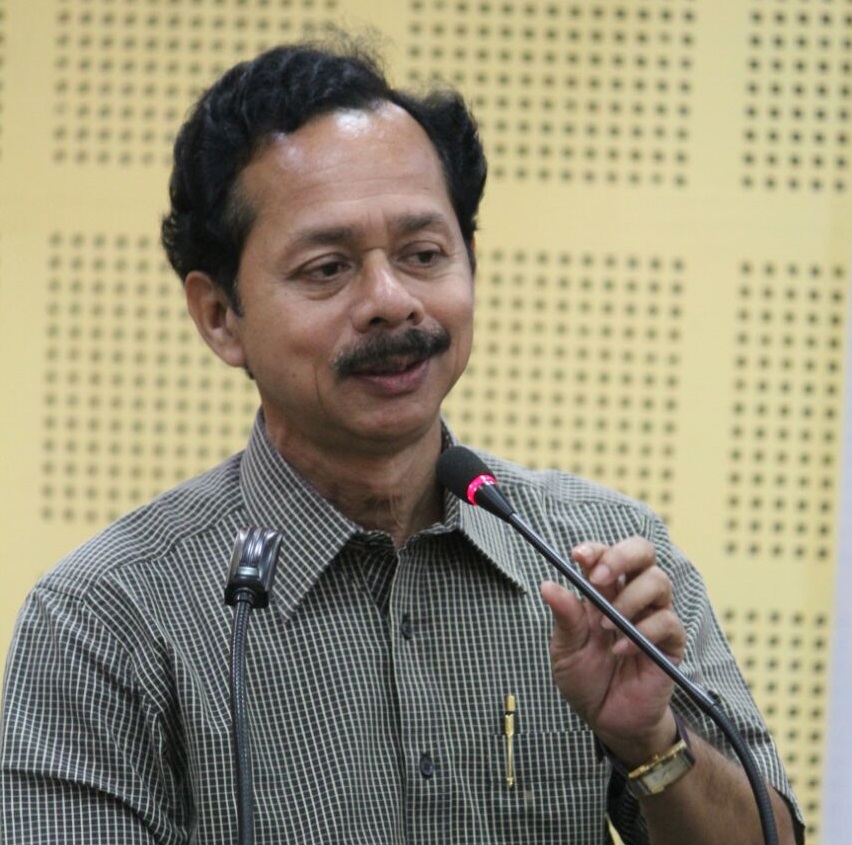
In India, as per the UGC guidelines, you have to publish your research findings at least in two international journals (journal having ISSN registered number with UGC credentials) before you submit your thesis for Pre-submission presentation. I had done it much before. Two ISSN journals had published my articles on ‘translation’. So I was ready for Pre-submission. Then on 20th September 2021 I got a call from the University to go for a Pre-submission Presentation. I did it and did it with style. The members of the SRC allowed me to go for the final submission.
In due course, my thesis was evaluated by two popular professors. It was well-appreciated by Dr.Indranil Acharya of Vidyasagar University, West Bengal and Dr.Charuchandra Mishra of Kirodimal Government Auto. College, Chhattisgarh. Dr.Jatindra Kumar Nayak, former Professor, Utkal University, and Dr.MrutyunjayMohanty, former Reader of Ravenshaw University also valued it. Then came the PhD viva voce. On 6th May, 2022 I was called by the university to face it. It was a bizarre experience to describe that day. The university students had a strike on that day. The VC of the university was log jammed. But I had to attend the PhD viva voce online. Yes, the same thing happened. I had to run from the strike. I assembled all the resource persons online and cracked the PhD viva voce. The dream came closure. On 17th June, 2022 the university notified about me getting qualified for the PhD. I was spell-bound to listen the news. The much awaited degree was conferred on me.
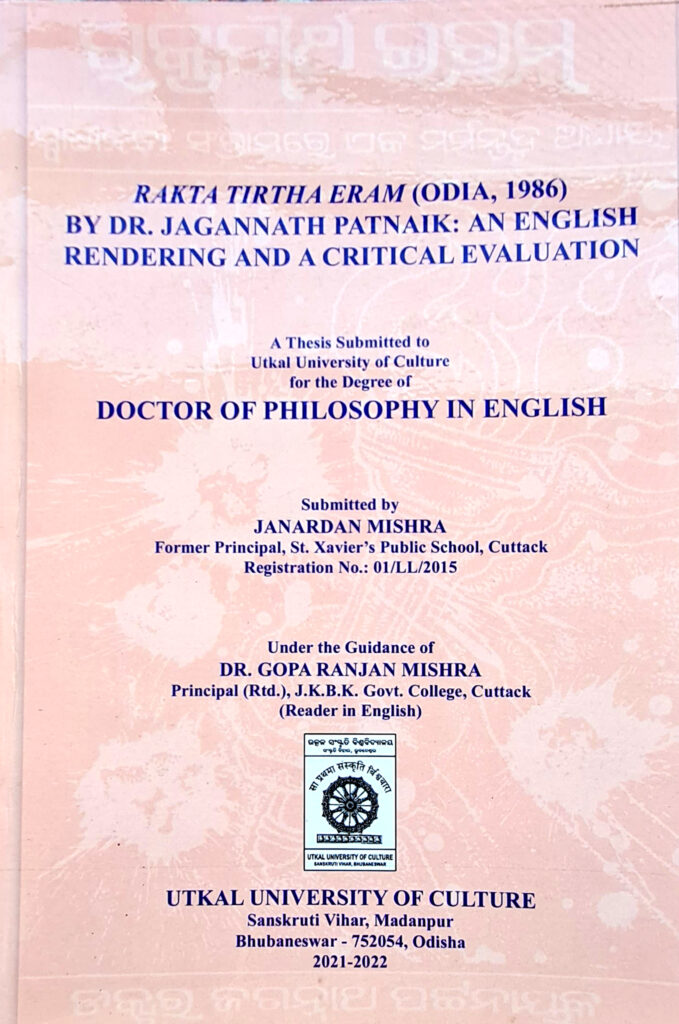
In due course, my thesis was evaluated by two popular professors. It was well-appreciated by Dr.Indranil Acharya of Vidyasagar University, West Bengal and Dr.Charuchandra Mishra of Kirodimal Government Auto. College, Chhattisgarh. Dr.Jatindra Kumar Nayak, former Professor, Utkal University, and Dr.MrutyunjayMohanty, former Reader of Ravenshaw University also valued it. Then came the PhD viva voce. On 6th May, 2022 I was called by the university to face it. It was a bizarre experience to describe that day. The university students had a strike on that day. The VC of the university was log jammed. But I had to attend the PhD viva voce online. Yes, the same thing happened. I had to run from the strike. I assembled all the resource persons online and cracked the PhD viva voce. The dream came closure. On 17th June, 2022 the university notified about me getting qualified for the PhD. I was spell-bound to listen the news. The much awaited degree was conferred on me.
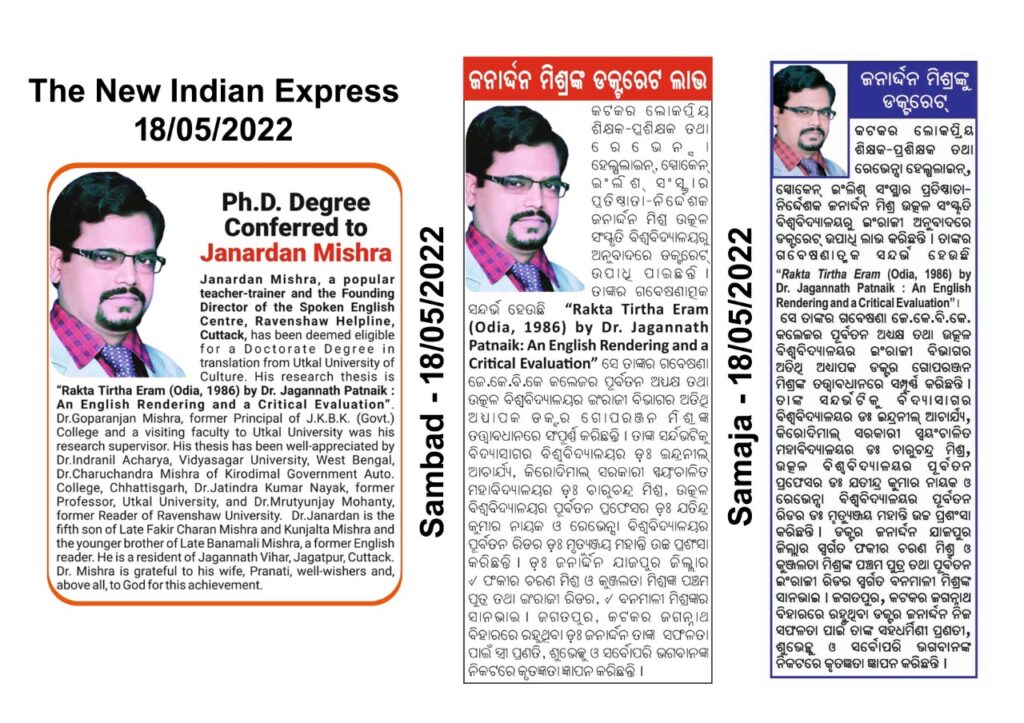
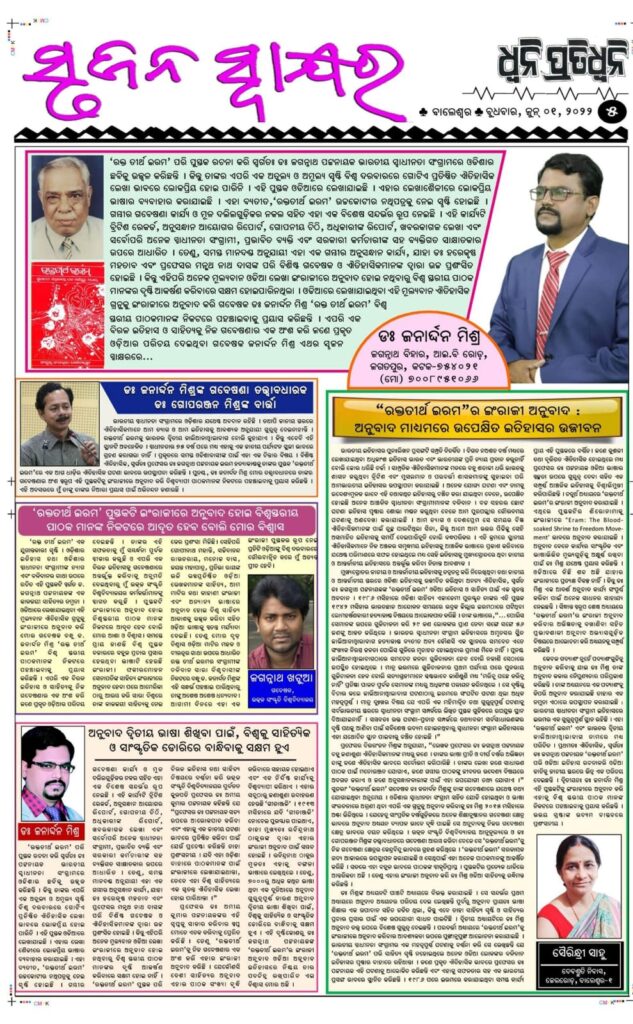
The best universities have extensive programs for helping the PhD scholars. But my university has none. It has a little resources for research. It does not provide any experienced supervisor. Yet, it is my university and I am proud of it.
– Dr.Janardan Mishra

